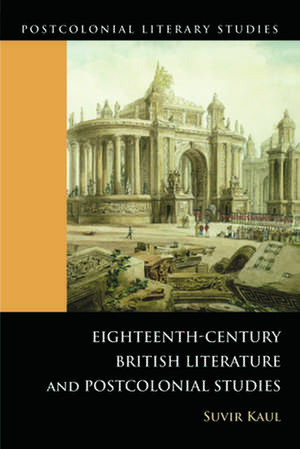Eighteenth-Century British Literature and Postcolonial Studies: Heroes and Villains: Postcolonial Literary Studies (Paperback)
Autor Suvir Kaulen Limba Engleză Paperback – 24 feb 2009 – vârsta de la 22 ani
| Toate formatele și edițiile | Preț | Express |
|---|---|---|
| Paperback (1) | 224.37 lei 6-8 săpt. | |
| EDINBURGH UNIVERSITY PRESS – 24 feb 2009 | 224.37 lei 6-8 săpt. | |
| Hardback (1) | 511.86 lei 6-8 săpt. | |
| EDINBURGH UNIVERSITY PRESS – 28 feb 2009 | 511.86 lei 6-8 săpt. |
Preț: 224.37 lei
Nou
Puncte Express: 337
Preț estimativ în valută:
42.94€ • 44.77$ • 35.69£
42.94€ • 44.77$ • 35.69£
Carte tipărită la comandă
Livrare economică 20 martie-03 aprilie
Preluare comenzi: 021 569.72.76
Specificații
ISBN-13: 9780748634552
ISBN-10: 074863455X
Pagini: 188
Dimensiuni: 155 x 234 x 13 mm
Greutate: 0.34 kg
Editura: EDINBURGH UNIVERSITY PRESS
Seria Postcolonial Literary Studies (Paperback)
Locul publicării:United Kingdom
ISBN-10: 074863455X
Pagini: 188
Dimensiuni: 155 x 234 x 13 mm
Greutate: 0.34 kg
Editura: EDINBURGH UNIVERSITY PRESS
Seria Postcolonial Literary Studies (Paperback)
Locul publicării:United Kingdom
Cuprins
Timeline; Introduction: Towards a Postcolonial History of Eighteenth-century English Literature; Postcolonial Studies and Empire today; Nation-formation and empire in the eighteenth century; Territory, trade routes, war and "Great Britain"; Print and Public Culture; Literary Creativity, Literary Criticism, Postcolonial Criticism; Plan of the Book; Chapter 1: Theaters of empire; Davenant, the revival of performance, and the thematics of empire; Aphra Behn, colonial self-making, and the uncertain consolations of romance; Civil tragedy, commercial humanism, and colonial consciousness; Chapter 2: The expanding frontiers of prose; Yariko and Inkle and the staging of polite culture; Crusoe the merchant-adventurer-and Friday; Chapter 3: Imaginative writing, intellectual history, and the horizons of British literary culture; The Spectator, print culture, and the circulation of inter-national value; The languages of national difference: becoming Roderick Random; Luxury, Commercial Society, Enlightenment historiography; Chapter 4: Perspectives from Elsewhere; Lady Mary Wortley Montagu and her Turkish Embassy Letters; Johnson's Rasselas: philosophy in an "oriental" key; Phillis Wheatley: literacy, poetry, and slavery


